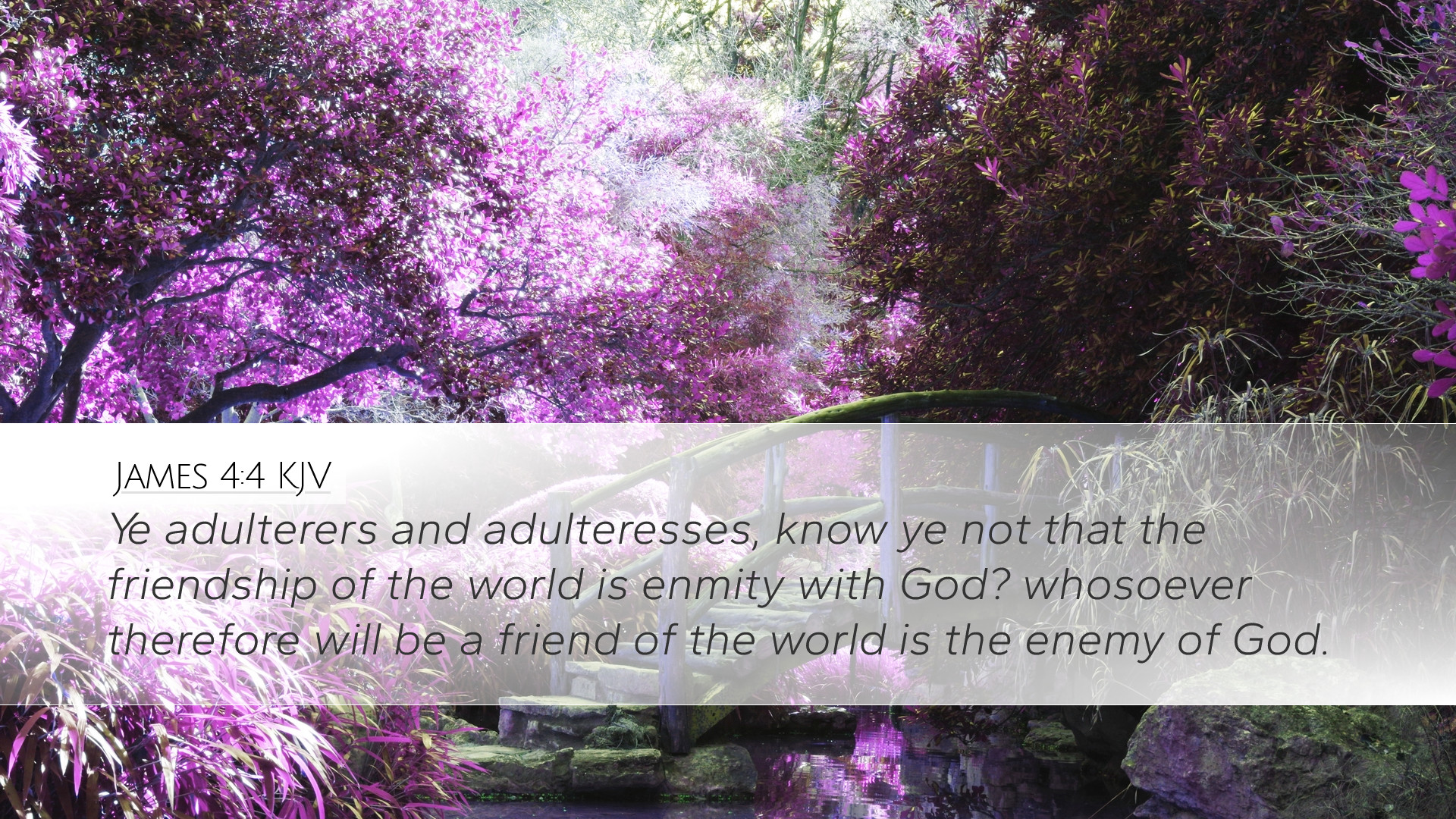Old Testament
Genesis Exodus Leviticus Numbers Deuteronomy Joshua Judges Ruth 1 Samuel 2 Samuel 1 Kings 2 Kings 1 Chronicles 2 Chronicles Ezra Nehemiah Esther Job Psalms Proverbs Ecclesiastes Song of Solomon Isaiah Jeremiah Lamentations Ezekiel Daniel Hosea Joel Amos Obadiah Jonah Micah Nahum Habakkuk Zephaniah Haggai Zechariah MalachiJames 4:4
James 4:4 KJV
Ye adulterers and adulteresses, know ye not that the friendship of the world is enmity with God? whosoever therefore will be a friend of the world is the enemy of God.
James 4:4 Bible Commentary
Commentary on James 4:4
Verse (James 4:4): "Ye adulterers and adulteresses, know ye not that the friendship of the world is enmity with God? Whosoever therefore will be a friend of the world is the enemy of God."
Introduction
The epistle of James is a call to genuine faith expressed through works. In 4:4, James addresses a critical issue concerning the nature of friendship with the world, portraying it as a serious spiritual dilemma. This commentary integrates insights from renowned public domain scholars to enhance understanding of this poignant verse.
Contextual Background
This verse exists within the broader context of James's warning against worldly desires and conflicts among believers. The preceding verses (James 4:1-3) elaborate on the source of disputes and the sinful nature of selfish ambition and unfulfilled lusts.
James’s invocation of the term "adulterers" serves as a stark metaphor that illustrates unfaithfulness not only to one another but ultimately to God. Such language is reminiscent of biblical prophets who frequently likened Israel's infidelity to spiritual adultery.
The Metaphor of Adultery
James’s reference to "adulterers and adulteresses" emphasizes the severity of being unfaithful to God. Albert Barnes notes that just as marital infidelity destroys trust within a covenant relationship, so does spiritual unfaithfulness violate the covenant between God and His people. This metaphor strongly suggests that to befriend the world is to betray God’s trust.
The Friendship of the World
James asserts that friendship with the world equates to enmity with God. Matthew Henry elaborates that this “friendship with the world” encompasses the values, pursuits, and pleasures that stand in opposition to divine principles. The idea of "the world" in this context refers to the system of values and behaviors that are contrary to the nature and will of God.
Furthermore, Adam Clarke comments that this does not imply a blanket condemnation of engaging with the world—after all, the call of believers is to be a light in the world—but rather a caution against adopting worldly values or lifestyles that compromise one’s commitment to God.
Enmity with God
The strong language that James employs points to a severe consequence of friendship with the world—it establishes enmity with God. Barnes emphasizes that such enmity is not passive; it represents active opposition to God’s purposes and character. When believers align themselves with worldly desires, they position themselves as enemies in direct conflict with God’s nature.
This principle serves as a sobering reminder that one cannot claim to both love the world and love God. The call to fidelity to God necessitates a rejection of worldly ideologies and compromise.
Applications for Today
- Self-Examination: The passage prompts a thorough self-examination regarding one's relationships, ambitions, and affiliations. Are they reflective of a commitment to God or conforming to worldly standards?
- Spiritual Vigilance: Pastors and theologians are encouraged to instill a sense of vigilance in their communities, highlighting the dangers of complacency in faith that can lead to spiritual adultery.
- Teaching on Covenant Faithfulness: This verse provides a rich foundation for teachings on covenant faithfulness, drawing parallels to the Old Testament and the nature of God’s promises to His people.
- Understanding Divine Jealousy: The subsequent verses (James 4:5) delve into the nature of God’s jealousy over His people, emphasizing His desire for a sincere relationship, which can serve as a nourishing theme for pastoral counseling.
Conclusion
In conclusion, James 4:4 challenges believers to reflect on their allegiances. The formidable illustration of spiritual adultery requires that they evaluate their priorities and relationships carefully. The insights from esteemed public domain commentaries by Matthew Henry, Albert Barnes, and Adam Clarke illuminate the grave consequences of striving for harmony with worldly pursuits while simultaneously professing allegiance to God. Ultimately, this passage calls believers to a life of unwavering fidelity to their Creator, necessitating difficult choices that reflect genuine faith in action.


